
Mediation Definition in Law: Key Principles and Applications
Overview
Mediation in law is a voluntary and confidential process. Here, a neutral third party helps conflicting parties communicate, guiding them toward a resolution that works for everyone involved. Have you ever felt overwhelmed by conflict? Mediation offers a compassionate alternative to litigation that can ease these tensions.
This approach is beneficial across various legal fields. It not only preserves relationships but also provides personalized solutions tailored to the unique needs of individuals. Imagine resolving disputes while maintaining important connections—this is the power of mediation.
By empowering individuals, mediation fosters a sense of agency and collaboration. It encourages parties to engage in meaningful dialogue, ultimately leading to outcomes that reflect their interests and values. Isn't it comforting to know that there’s a way to resolve conflicts that prioritizes your feelings and needs?
In conclusion, if you’re facing a legal challenge, consider mediation as a supportive path forward. It’s a valuable tool that can transform conflict into cooperation, helping you find peace and resolution in a nurturing environment.
Introduction
Mediation shines brightly in the often tumultuous world of legal disputes, offering a voluntary and confidential path to resolution. It empowers you to take control of your conflicts, fostering an environment where relationships can be preserved and tensions eased. But what happens when one party hesitates to engage, or when the stakes feel too high for a simple conversation? These challenges can be daunting.
Exploring the nuances of mediation reveals its essential role in law. It embodies key principles that prioritize understanding and collaboration. Imagine a process where your voice is heard, and your concerns are addressed—this is the transformative potential of mediation for those navigating conflict.
As you consider your options, remember that mediation is not just a method; it’s a compassionate approach to resolving disputes. It invites you to reflect on what you truly desire from the situation. Could this be the supportive solution you’ve been seeking? Let’s delve deeper into how mediation can help you find peace and resolution.
Define Mediation: Understanding Its Role in Law
The mediation definition in law refers to a voluntary and confidential process where a neutral third party, known as the mediator, helps facilitate communication between conflicting sides. This approach is designed to assist you in reaching a mutually agreeable outcome. Unlike litigation, where a judge imposes a decision, mediation empowers you to take control of the resolution of your conflict.
This process is especially valuable in legal contexts, reflecting the mediation definition in law, as it preserves relationships, reduces hostility, and offers a more personalized approach to resolving disputes. Have you ever felt overwhelmed by conflict? Mediation provides a nurturing environment where your concerns are heard and addressed.
The mediation definition in law indicates that it is frequently utilized across various legal fields, including family law, commercial disputes, and labor relations. This versatility makes mediation a powerful tool in the legal landscape, which reflects the mediation definition in law. By choosing mediation, you are not just seeking a resolution; you are fostering understanding and cooperation.
Consider the benefits of mediation:
- Empowerment: You control the outcome.
- Preservation of Relationships: Maintain connections while resolving issues.
- Personalized Solutions: Tailored resolutions that fit your unique situation.
If you are facing conflict, think about exploring mediation as a compassionate path forward. It can be a transformative experience, guiding you toward a resolution that honors your needs and emotions.
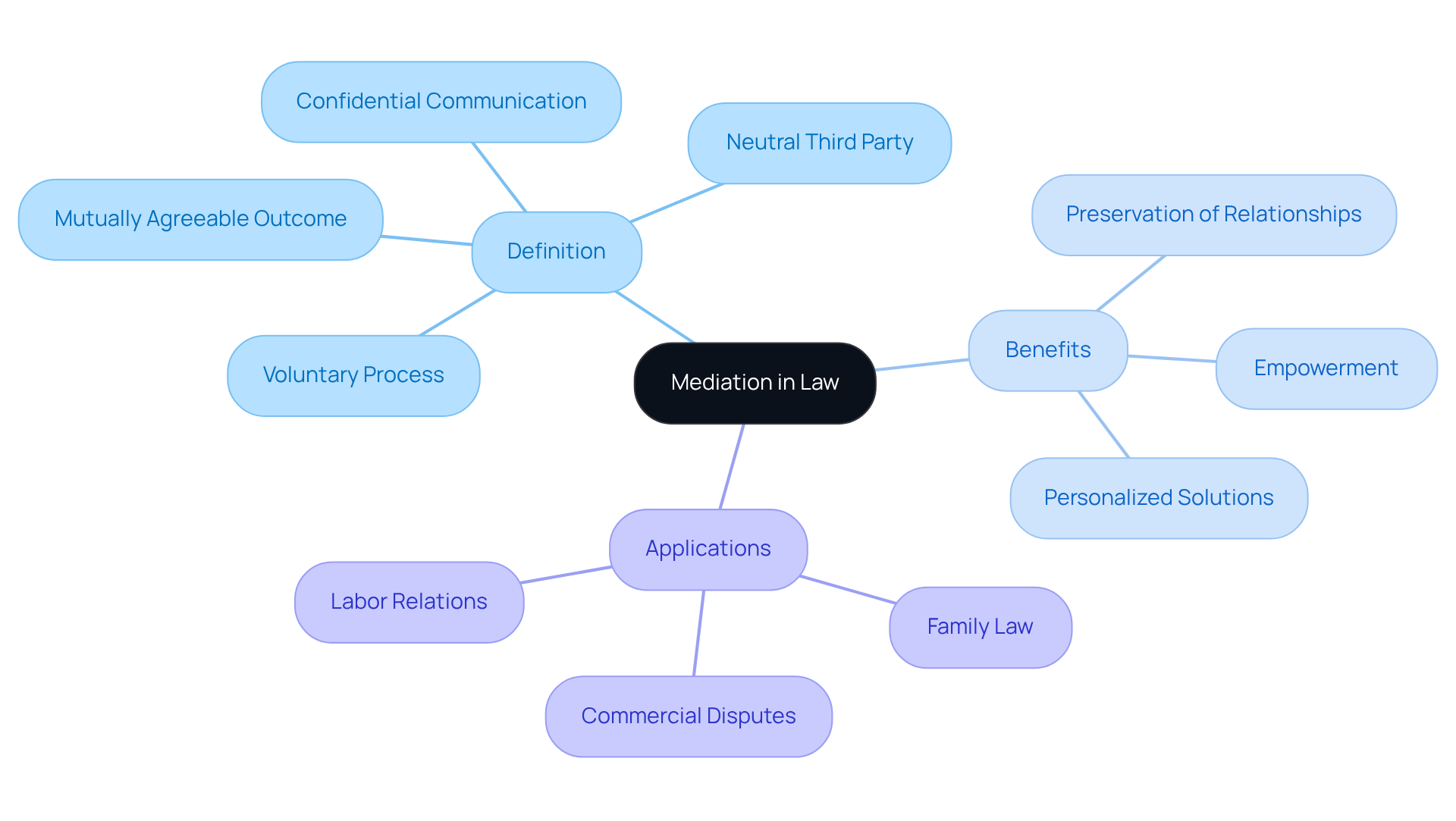
Trace the History of Mediation: Evolution and Milestones
The origins of negotiation can be traced back to ancient societies, where community leaders often served as intermediaries to settle conflicts. Can you imagine how vital these roles were in maintaining peace? In ancient Greece, the idea of conflict resolution was recognized as essential for sustaining social harmony. Over the centuries, these practices have evolved significantly, especially in the 20th century, when formal programs began to emerge in response to the growing need for alternative dispute resolution methods.
The creation of groups like the American Arbitration Association in 1926 marked a major milestone in the formalization of conflict resolution practices. This was not just a step forward in legal terms; it was a compassionate response to the needs of individuals seeking resolution. Today, the mediation definition in law is recognized globally as an effective method for conflict resolution, supported by various legal frameworks and professional standards.
Understanding these developments can inspire us to seek peaceful resolutions in our own lives. How might embracing these practices help you or someone you care about? Together, we can navigate conflicts with empathy and understanding.
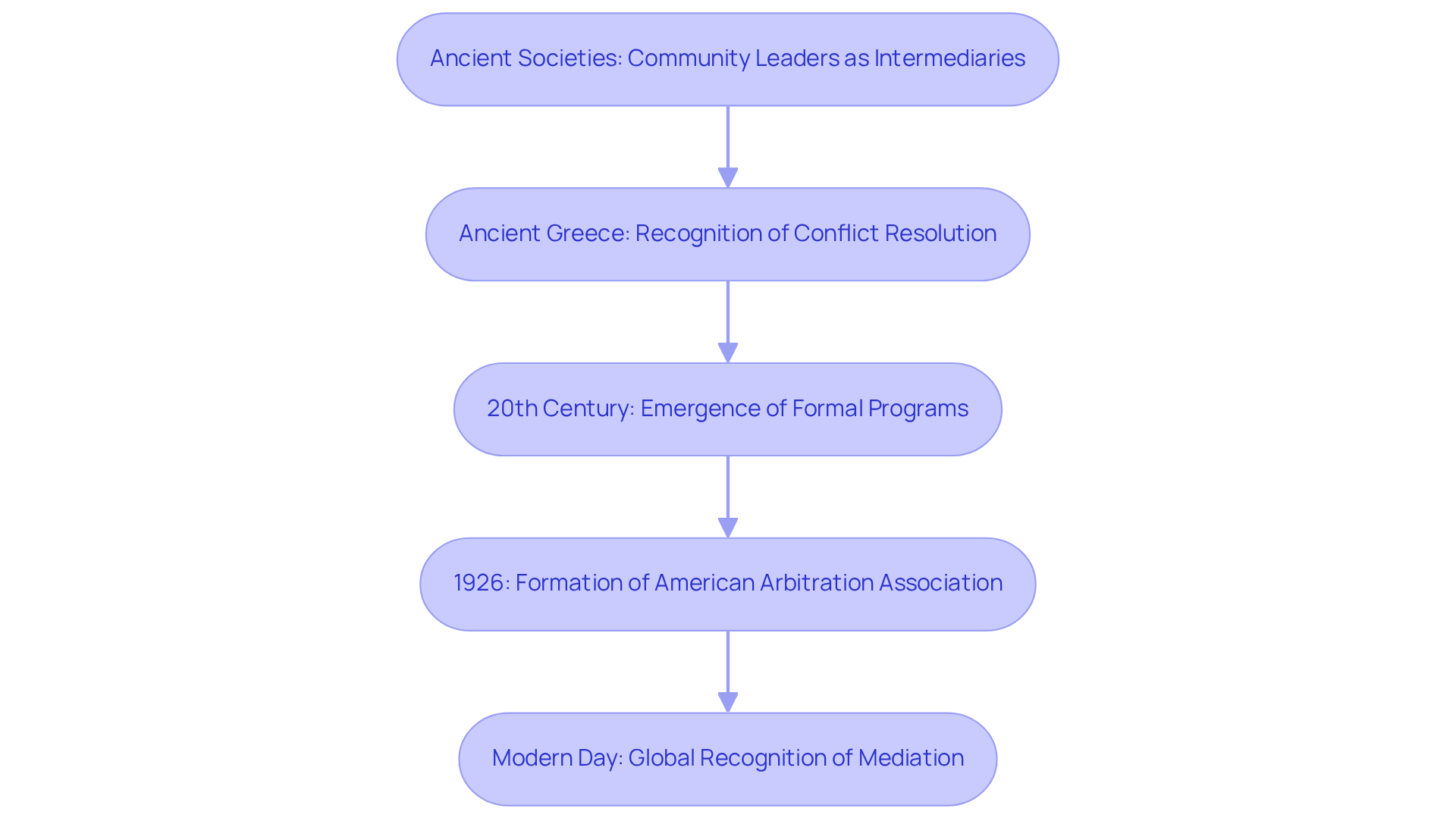
Identify Key Characteristics of Mediation: Principles and Practices
Key characteristics of this process include confidentiality, neutrality, and voluntary participation.
-
Confidentiality ensures that conversations during the process remain private, allowing for open communication without fear of consequences. Have you ever felt hesitant to speak up due to concerns about privacy? This aspect promotes a safe space for dialogue.
-
Neutrality is vital, as the mediator must remain impartial, facilitating dialogue without taking sides. Imagine a situation where both parties feel heard and understood, without bias influencing the conversation. This balance fosters trust and encourages honest discussion.
-
Voluntary participation means that participants are not compelled to reach an agreement, allowing them to explore options freely. This freedom can lead to more satisfying outcomes, as individuals feel empowered to voice their needs and desires.
Additionally, this process is often characterized by its flexibility, tailored to the specific needs of the parties involved. This adaptability makes it a preferred choice for many individuals and organizations seeking resolution.
By embracing these characteristics, we can create an environment that nurtures understanding and collaboration. Are you ready to explore how this process can work for you?
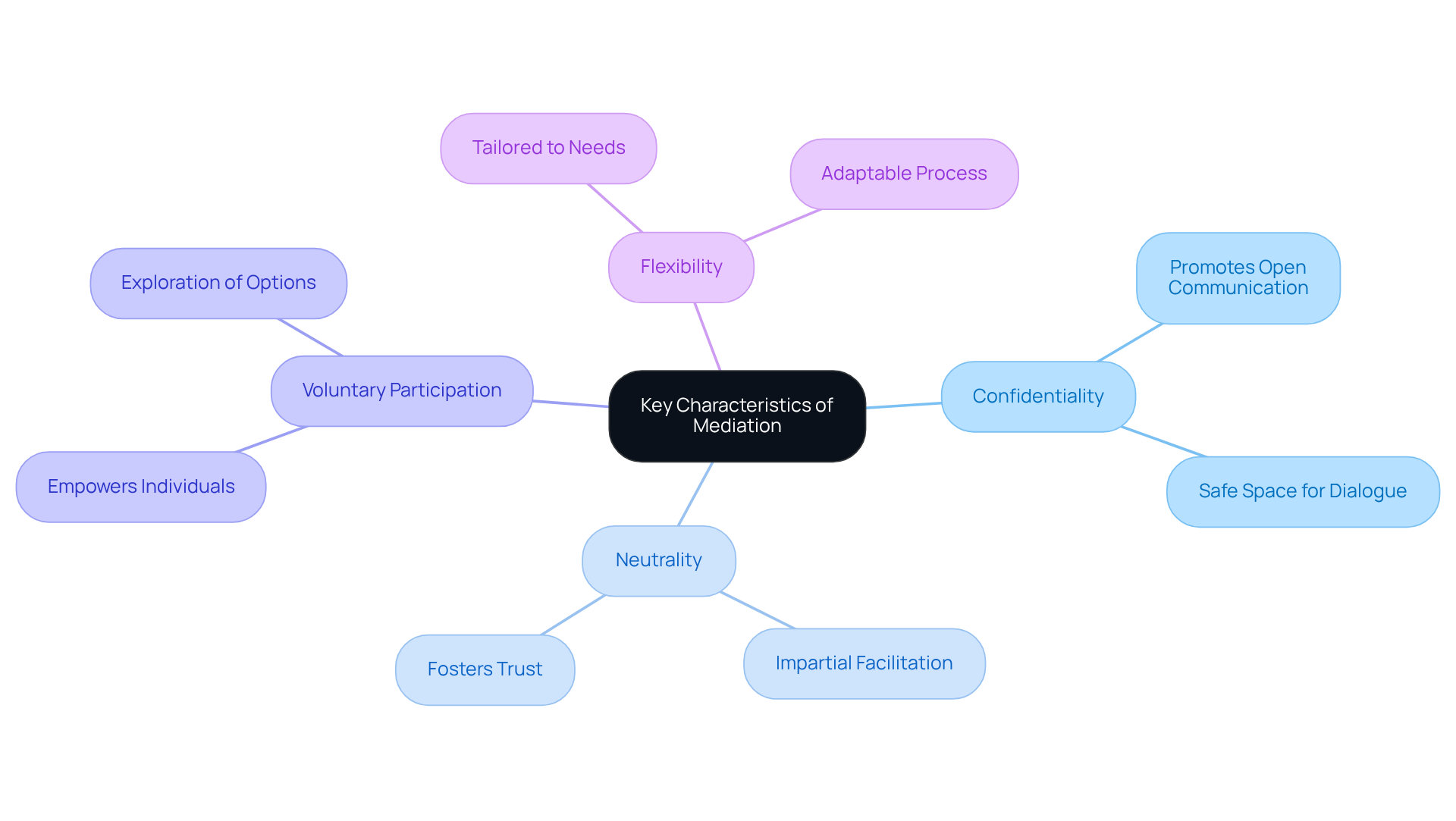
Explore Applications of Mediation: From Family to Commercial Disputes
The mediation definition in law highlights its crucial role in various situations, from family conflicts like divorce and child custody to commercial disagreements involving contracts and business partnerships. Have you ever felt overwhelmed by the emotional strain of these conflicts? In family law, the mediation definition in law encompasses alternative dispute resolution, which allows parties to negotiate terms amicably, reducing stress and encouraging cooperative co-parenting arrangements.
In the commercial sector, businesses often seek alternative resolution methods, which align with the mediation definition in law, to settle disputes effectively. This approach helps avoid the high costs and lengthy processes associated with litigation. For example, many corporations now include conflict resolution clauses in their contracts to ensure that disputes are handled swiftly and effectively.
The flexibility of negotiation, often highlighted in the mediation definition in law, makes it an essential tool for resolving conflicts across different areas. It fosters cooperation and understanding among groups. By embracing mediation, we can create a more harmonious environment for everyone involved. Wouldn’t it be wonderful to navigate conflicts with compassion and care?
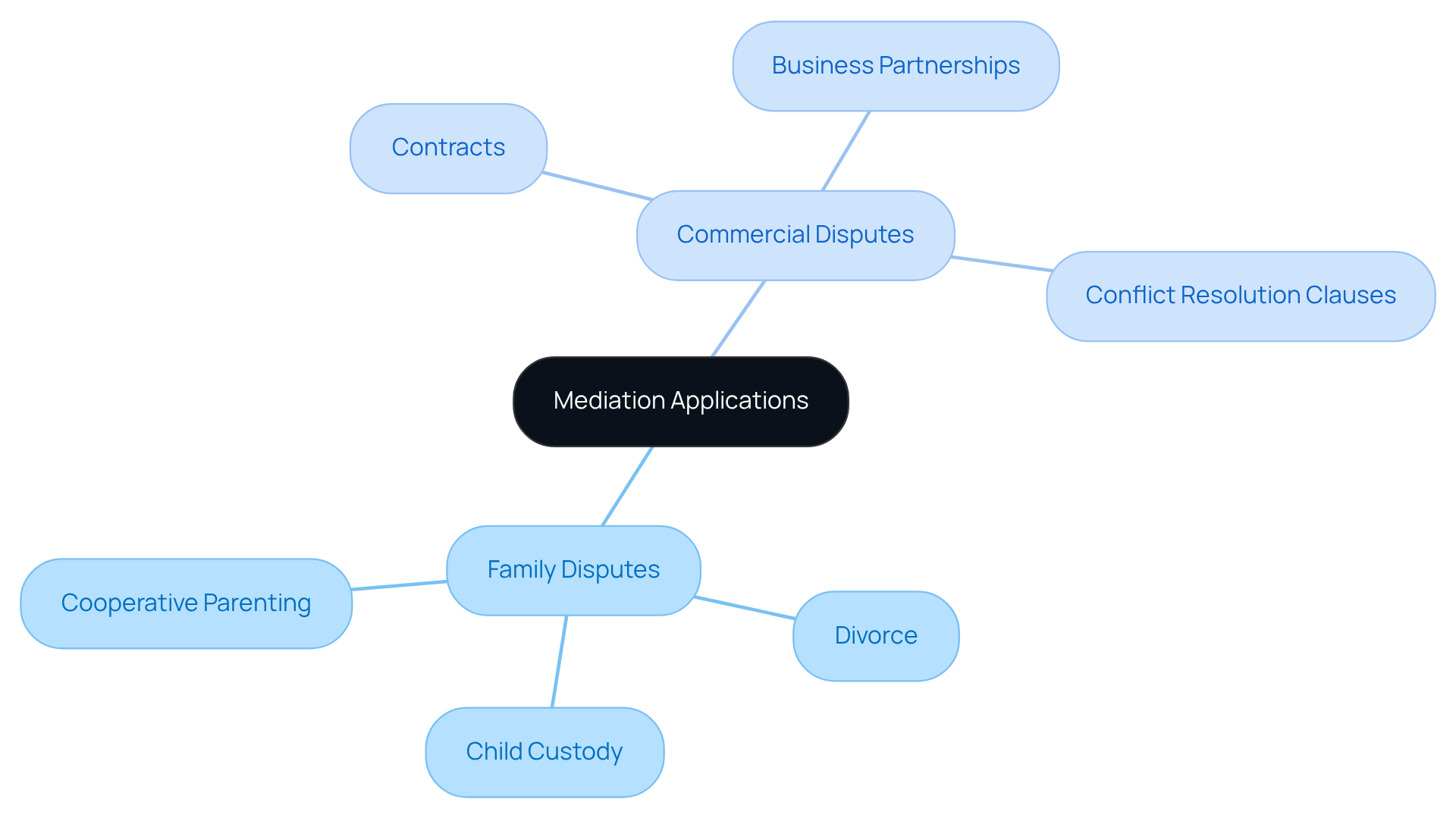
Challenges and Limitations of Mediation
Negotiation can be a powerful tool, but it comes with its own set of challenges that can feel overwhelming. Have you ever found yourself in a situation where one side just isn’t willing to meet halfway? It’s frustrating, isn’t it? The reality is, for negotiation to work, both parties need to be ready to engage. When one side is uncooperative, reaching a resolution can seem like an uphill battle.
Moreover, it’s important to recognize that alternative dispute resolution isn’t a one-size-fits-all solution. Some conflicts, particularly those involving significant power imbalances or where legal rights are at stake, may not be suited for this approach. Without a binding decision, unresolved issues can linger if an agreement isn't reached, leaving everyone feeling unsettled.
Despite these hurdles, many individuals discover that the benefits, as outlined in the mediation definition in law, often outweigh the challenges. The mediation definition in law illustrates that mediation can be cost-effective and help preserve relationships, which is invaluable in both personal and professional contexts. So, as you navigate these complexities, remember that seeking out mediation, based on the mediation definition in law, can be a compassionate step forward. Together, we can find a path to resolution that respects everyone’s needs.
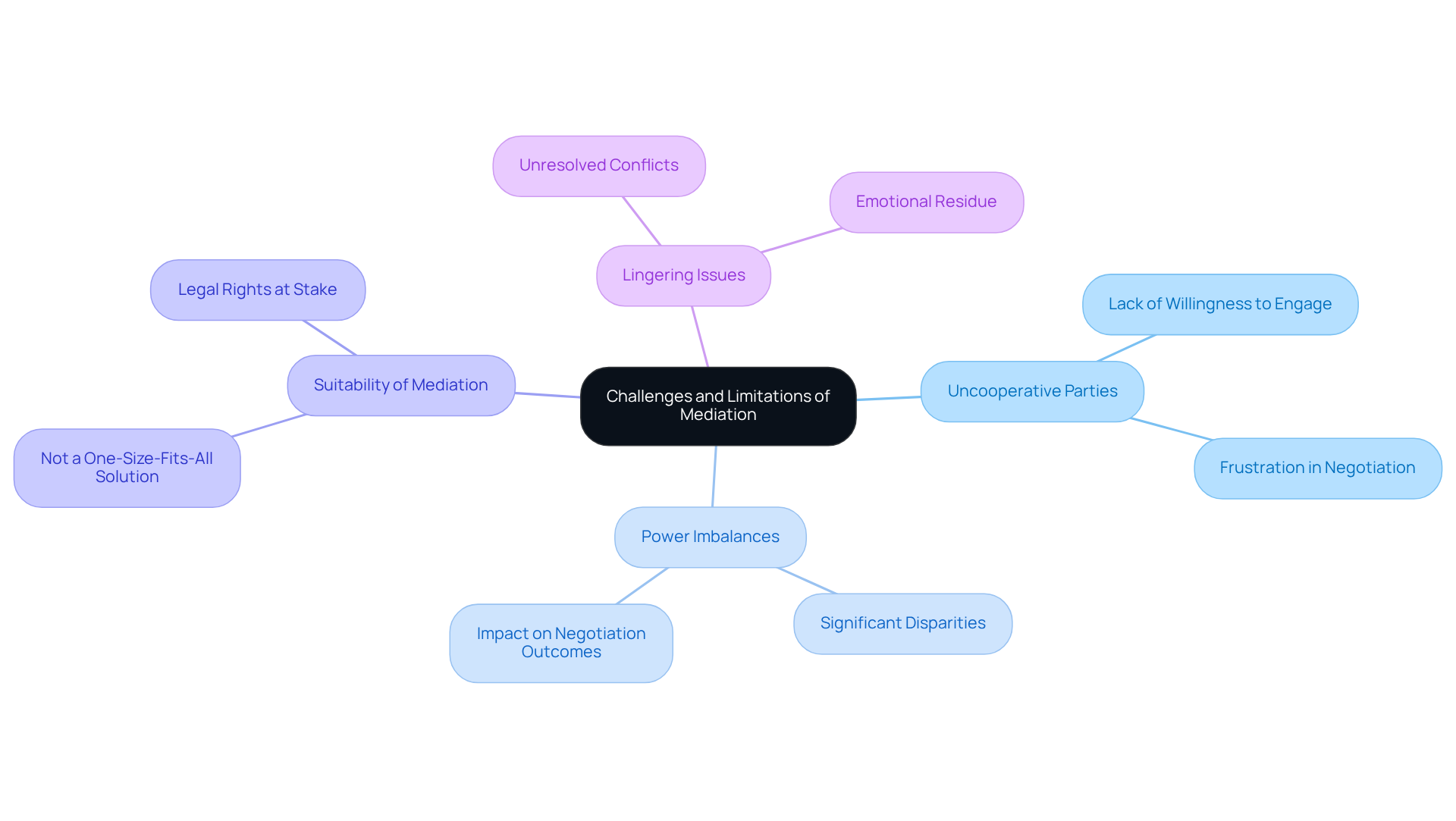
Conclusion
Mediation stands as a vital mechanism in our legal landscape, offering a voluntary and confidential way to resolve conflicts with the help of a neutral third party. This approach empowers you to take control of your disputes, fostering an environment ripe for understanding and cooperation. By choosing mediation, you can navigate differences in a way that preserves relationships and leads to personalized solutions tailored just for you.
Throughout this article, we’ve explored key principles of mediation, including its historical evolution and essential characteristics like confidentiality and neutrality. We’ve looked at its diverse applications in family law, commercial disputes, and beyond. The importance of voluntary participation and the flexibility of mediation has been underscored, reinforcing its effectiveness as an alternative to litigation. While challenges such as power imbalances and uncooperative parties may arise, the benefits of mediation often outweigh these limitations, making it a compelling choice for conflict resolution.
In a world where conflicts are inevitable, embracing mediation as a compassionate and constructive approach can lead to more harmonious outcomes. Whether you’re navigating personal disputes or commercial disagreements, the principles of mediation can guide you toward resolutions that honor your needs and foster lasting relationships. By considering mediation as a viable option, you can take proactive steps toward resolving conflicts with empathy, ultimately contributing to a more understanding and cooperative society.
Key Benefits of Mediation:
- Empowers individuals to control their disputes
- Preserves relationships while resolving conflicts
- Offers personalized solutions tailored to unique circumstances
- Fosters understanding and cooperation
So, as you reflect on the conflicts in your life, consider mediation. It’s a path toward resolution that not only addresses your needs but also nurtures a more compassionate society for all of us.
Frequently Asked Questions
What is mediation in the context of law?
Mediation in law is a voluntary and confidential process where a neutral third party, known as the mediator, facilitates communication between conflicting sides to help them reach a mutually agreeable outcome.
How does mediation differ from litigation?
Unlike litigation, where a judge imposes a decision, mediation empowers individuals to control the resolution of their conflict, allowing for more personalized and cooperative outcomes.
What are the benefits of mediation?
The benefits of mediation include empowerment in controlling the outcome, preservation of relationships while resolving issues, and the ability to create tailored solutions that fit unique situations.
In which legal fields is mediation commonly utilized?
Mediation is frequently utilized in various legal fields, including family law, commercial disputes, and labor relations.
What is the historical significance of mediation?
The origins of mediation can be traced back to ancient societies where community leaders served as intermediaries. The practice has evolved significantly, particularly in the 20th century, with the establishment of formal programs and organizations like the American Arbitration Association in 1926.
How has mediation been recognized in modern times?
Today, mediation is recognized globally as an effective method for conflict resolution, supported by various legal frameworks and professional standards.


